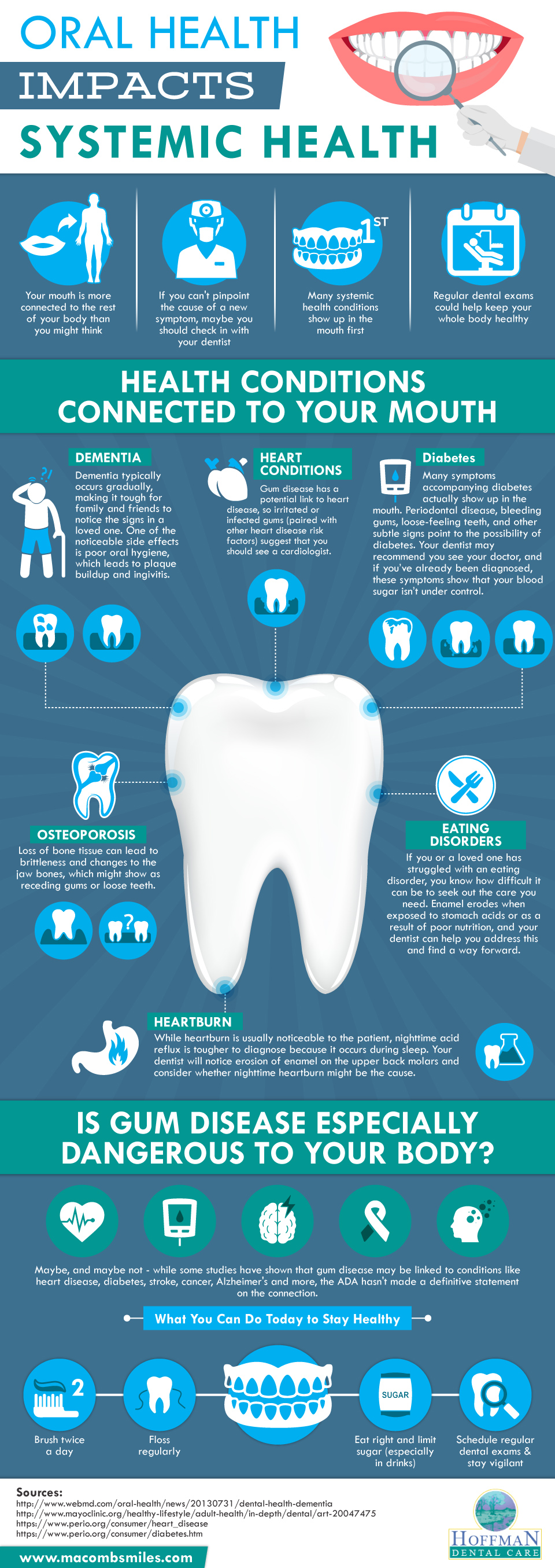You know that healthy teeth and gums help you build a beautiful smile and avoid uncomfortable, expensive dental appointments. But staying healthy has positive ramifications far beyond that. In fact, research continues to suggest that avoiding dental problems will help you avoid other health conditions – including some of the most serious.
Your oral health is something that you tend to over months and years. The little actions that you take each day dictate how well you prevent gum disease and avoid plaque buildup. And those little actions may also help you avoid health problems like cardiovascular disease, stroke, some cancers, Alzheimer’s and more.
Keep reading to learn more about the mouth-body connection – and get in touch to schedule an exam and make sure your own oral health is in great shape.
Health Conditions with an Oral Connection

The Best Ways to Stay Healthy
There’s a lot to consider when trying to stay healthy – whether you’re addressing your teeth and gums or your whole body. But since different components of your health are so interconnected, making changes in one area will help you improve another. Here are some of the best holistic adjustments you can make to your life:
- Improve your diet – Everything that you put into your body has an impact – and the very first one, before digestion even begins, is on your mouth. Acidic foods and drinks erode enamel. Highly sugary or starchy foods give rise to bacteria, which forms a layer of plaque on your teeth. But the benefits of avoiding sugars and starches don’t end there – they also cause weight gain and other problems in your body. If you’re not sure where to start with your dietary adjustments, visit a nutritionist or ask about healthy alternatives at your next dental exam.
- Brush up on your oral hygiene techniques (pun fully intended) – We learn how to clean our teeth as children, and we don’t get many refreshers in the decades that come afterwards. It’s important to make sure that you’re brushing and flossing effectively – otherwise, you’re spending useless time other the sink and still going to experience cavities and gingivitis. Ask about spot that could use a little more attention at your next exam – we might have product recommendations or techniques that will help you enjoy brushing and flossing.
- Schedule regular exams – You should visit the dentist every six months – and in some cases, even more often. If you have a history of gum disease, are a tobacco user, or frequently develop cavities, you might benefit from more frequent exams. If you stay on top of your exam schedule, you can catch dental problems before they worsen and require more invasive treatment.
- Consider your family history – Your parents and relatives’ health histories will give you a better idea of your genetic predisposition. This will help you take preventive actions that are specific to your needs.
Schedule your next exam today to get your health on the right track!
Macomb General Dentist | General Dentistry Macomb | Dentist Macomb County
Related Articles
We all know we should floss, but it can be tough. Part of this is because flossing can feel like an extra task in an already busy day, but it...
Most people just aren't getting enough sleep. And the sleep we do get is often not the best. If you find yourself waking up groggy or having trouble getting through...
Pregnancy is exciting. It’s a time filled with many changes and a lot of looking forward to the future. While most moms-to-be are busy preparing, one area that often gets...
